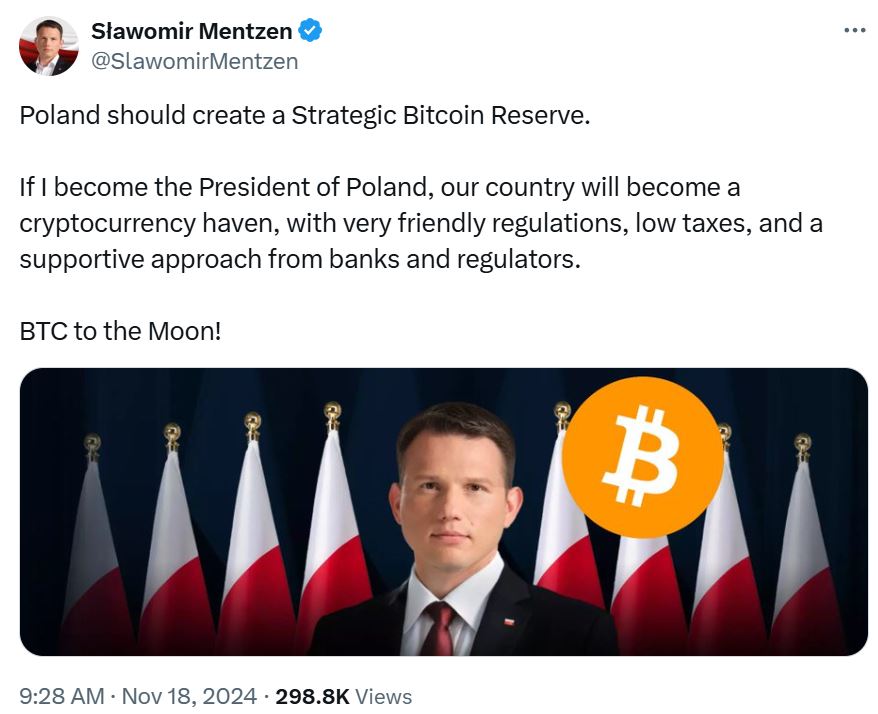Polish Presidential Candidate Sławomir Mentzen Pledges to Establish a Bitcoin Reserve if Elected
In a political landscape where cryptocurrency is increasingly central to national economic strategies, Sławomir Mentzen, a Polish presidential candidate, has committed to incorporating Bitcoin into Poland’s financial infrastructure if he wins the 2025 presidential election. This bold pledge, announced amid growing global interest in cryptocurrency, positions Poland to potentially join nations that have already integrated digital assets into their national reserves.

Mentzen made his announcement on November 17 via X (formerly Twitter), where he expressed his support for creating a Bitcoin reserve. His proposal echoes a similar initiative by U.S. President-elect Donald Trump, who promised to establish a Strategic Bitcoin Stockpile as part of his campaign platform. This growing political focus on Bitcoin reflects its rising significance on the global stage.
During an exchange on X, Lech Wilczynski, CEO of the crypto exchange Swap.ly, presented an open-source policy model for a Strategic Bitcoin Reserve, developed by the Satoshi Action Fund, a cryptocurrency advocacy group. Wilczynski emphasized the model’s practicality, urging policymakers to adopt actionable plans instead of vague legislative promises. He directly asked Mentzen if he would implement such a policy if elected. Mentzen’s response was unequivocal: he pledged to pursue the initiative, signaling a potential shift in Poland’s financial strategy toward embracing Bitcoin as a national asset.
Poland’s Bitcoin Vision: Leading the Crypto Charge in Central Europe
If implemented, Mentzen’s proposal could place Poland at the forefront of the global trend toward national Bitcoin adoption. The initiative would align Poland with countries like El Salvador, which made Bitcoin legal tender in 2021 under President Nayib Bukele. El Salvador’s financial reserves now include 5,748.8 BTC, a strategy that has drawn both praise and criticism internationally. Similarly, Bhutan has quietly accumulated nearly $780 million in Bitcoin through state-sponsored mining, demonstrating how nations of varying sizes are integrating cryptocurrency into their economic strategies.
Mentzen’s Bitcoin reserve plan also underscores a growing recognition of digital currencies as tools for economic innovation and resilience. His commitment resonates with a segment of the Polish electorate, particularly libertarian and right-wing voters, who view cryptocurrency as a path toward greater financial independence and modernization.
A Global Wave of Bitcoin Advocates
Mentzen’s position reflects a broader global movement. In the U.S., Donald Trump made waves with his promise to create a Bitcoin Stockpile, signaling a shift in how major economies perceive digital currencies. The proposal has gained traction, with Senator Cynthia Lummis introducing a bill in July 2023 to establish a U.S. Bitcoin reserve. The plan outlines acquiring one million BTC over five years as a hedge against national debt and a long-term store of value.
These initiatives indicate a growing acceptance of Bitcoin as a strategic financial asset, moving beyond its origins as a speculative investment. While the U.S. and Poland are still in the planning stages, smaller nations like El Salvador and Bhutan are already demonstrating the viability of integrating Bitcoin into their economic frameworks.
Poland’s Role in Shaping Cryptocurrency Policy
Mentzen’s proposal comes at a pivotal moment for the global cryptocurrency landscape. As Poland prepares for the 2025 presidential election, the nation could become a key player in shaping cryptocurrency policy in Central Europe. A Bitcoin reserve would signal Poland’s readiness to embrace the digital economy and strengthen its position as a forward-thinking financial hub.
Mentzen’s vision also ties into the broader trend of governments reevaluating traditional financial systems. By exploring decentralized assets like Bitcoin, countries can diversify their reserves and mitigate risks associated with fiat currencies and geopolitical uncertainties.
Challenges and Opportunities
While Mentzen’s proposal is ambitious, it also raises questions about the feasibility and risks of adopting Bitcoin as a national reserve. Critics point to Bitcoin’s volatility and the potential for regulatory hurdles. However, proponents argue that Bitcoin’s decentralized nature and limited supply make it a valuable hedge against inflation and currency devaluation.
If Poland follows through on Mentzen’s vision, it could pave the way for broader adoption of cryptocurrency in the region. The move would also align Poland with the growing number of nations recognizing Bitcoin’s potential as a strategic financial asset.
Conclusion: A Turning Point for Poland and Global Finance
Sławomir Mentzen’s pledge to establish a Bitcoin reserve reflects a bold step toward integrating cryptocurrency into Poland’s national strategy. If realized, the initiative could position Poland as a leader in the global shift toward digital assets. As countries like the U.S., El Salvador, and Bhutan continue to explore Bitcoin’s potential, Poland’s 2025 presidential election may serve as a critical moment for the broader adoption of cryptocurrency in traditional financial systems.
The race to incorporate Bitcoin into national reserves is intensifying, and decisions made in the coming years will undoubtedly shape the future of global finance. For Poland, embracing Bitcoin could signify not just a technological evolution but a strategic move to secure its place in the digital economy.

